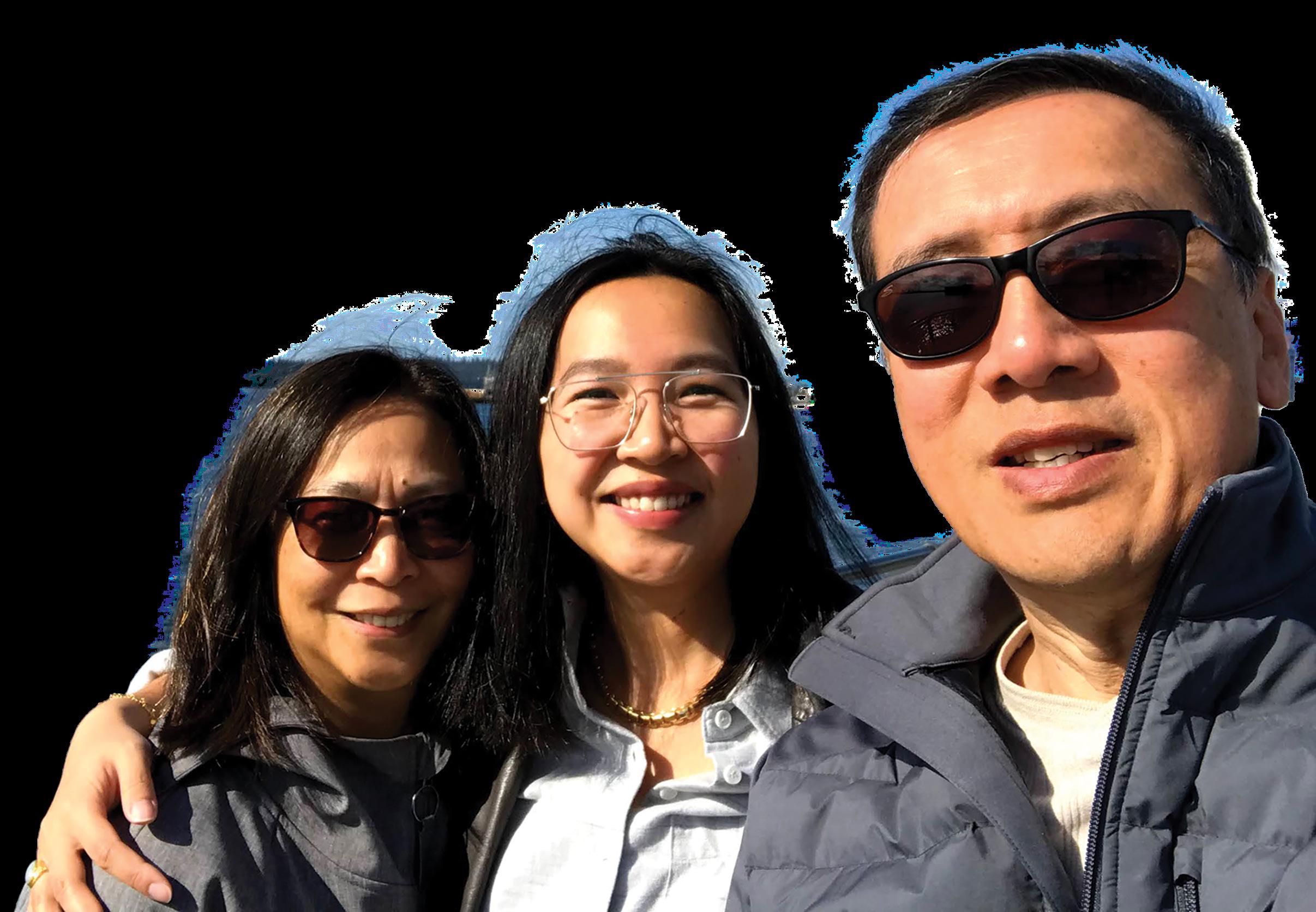ROYAL COLUMBIAN
FOUNDATION

ROYAL COLUMBIAN
FOUNDATION
THE ONE AND ONLY
FROM NEAR DEATH TO NEW LIFE
Glenn Duff’s encounter with extraordinary care
COMPLEX PROBLEMS
NEED NEW SOLUTIONS
Pioneering solutions for healthcare challenges
TRANSFORMING THE FUTURE
A new robotics program will set the benchmark for excellence in surgical practice
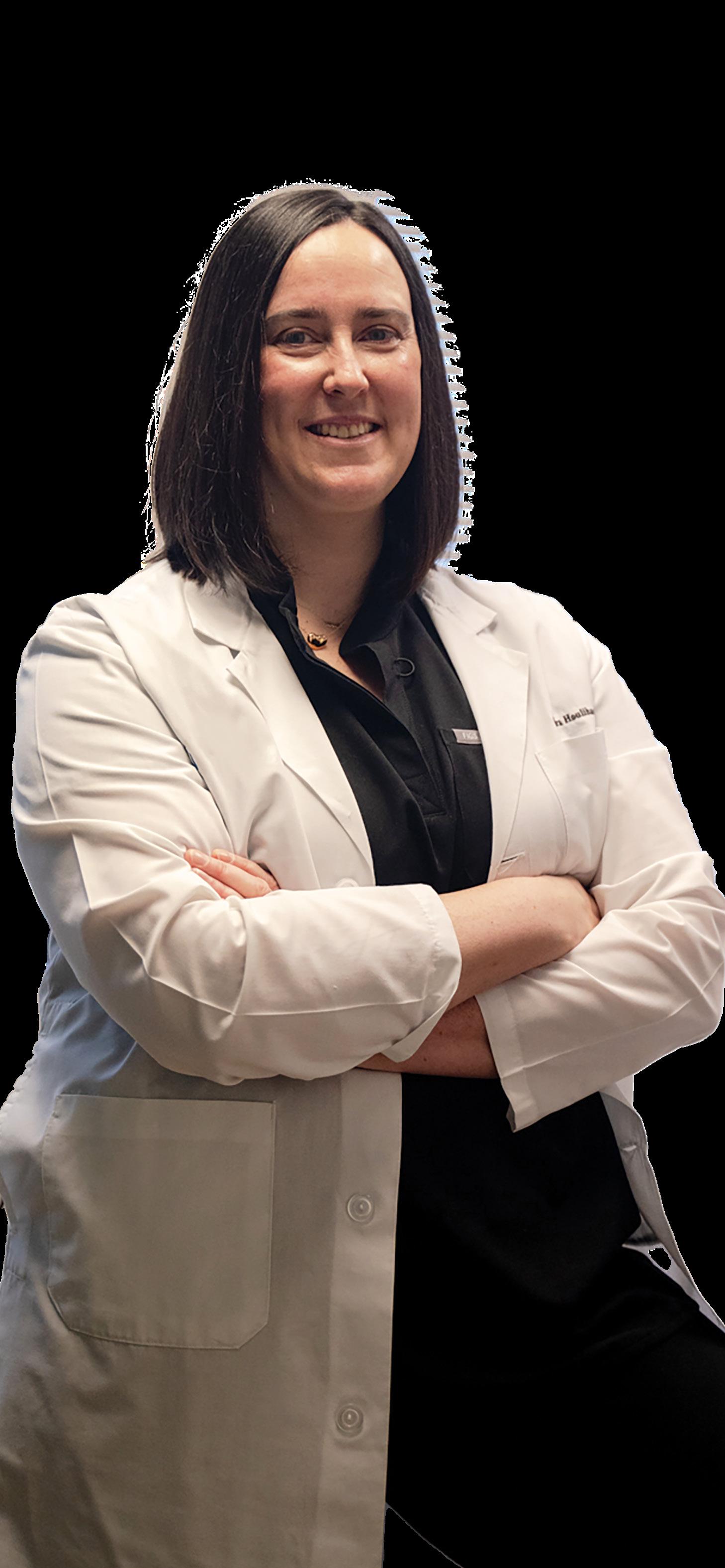



Royal Columbian Hospital serves as a major critical care hospital for many in our province. No other centre in British Columbia offers our scope of services, delivered at such a high level.
Sometimes, Royal Columbian Hospital is a patient’s only hope.
Reading through this latest edition of Your Health Matters, you will find stories that showcase our unique level of expertise — expertise that serves a population equal to a third of British Columbians. Each story is an example of the passion Royal Columbian Hospital and its staff have to bring uncompromising care and remarkable patient experiences to the province.
In this magazine, you’ll read about the future of Royal Columbian Hospital. The ongoing redevelopment includes the state-of-the-art Jim Pattison Acute Care Tower, which is beginning to take shape. As we move closer to its 2025 opening, we are excited about this opportunity to share about the interventional super-floor, with cutting edge technology as a part of it. This includes an interview with
 Cameron Belsher Chair, Royal Columbian Hospital Foundation
Cameron Belsher Chair, Royal Columbian Hospital Foundation
Dr. Brian Yang about the future of robotic surgery, and what that will look like at Royal Columbian Hospital.
You’ll also read about steps taken to address maternal health, through Dr. Sara Houlihan’s work in the Placenta Accreta Spectrum (PAS) clinic — the only such clinic in all of BC.
There are other stories you’ll read, of patients whose lives were changed because of the life-saving care they received at Royal Columbian Hospital, and staff who look to continue to make advances in their field.
But our ability to be the home to the future of healthcare in British Columbia is only made possible because of generous donors. In 2023, we saw many donors come forward to support the work of Royal Columbian Hospital — with a passion for supporting innovation, development, and the patient-centred care people have come to expect from Royal Columbian Hospital. We thank you on behalf of the many lives touched by your support.
We hope, as always, that you enjoy reading these latest stories from Royal Columbian Hospital.
 Jeff Norris President & CEO, Royal Columbian Hospital Foundation
Jeff Norris President & CEO, Royal Columbian Hospital Foundation
ROYAL COLUMBIAN HOSPITAL FOUNDATION
ROYAL COLUMBIAN HOSPITAL FOUNDATION BOARD OF DIRECTORS
Chair Cameron Belsher
Vice Chair
Norm Taylor
Treasurer Han Shu
Secretary Jennifer Podmore Russell
President and CEO Jeff Norris
Directors
Hema Bhatt, Dr. Sukh Brar, John Clinton, Hayley Woodin Hastings, Diana Miles, Lynn Radbourne, Farid Rohani, Dr. Carolyn Shiau, Rana Vig, Fred Withers



We welcome your comments on Your Health Matters magazine. Please email info@rchfoundation. com or write to us c/o Royal Columbian Hospital Foundation, 330 East Columbia St, New Westminster, B.C. V3L 3W7
Established in 1978, Royal Columbian Hospital Foundation raises millions of dollars annually to purchase medical equipment, fund innovative programs, and support training and research. To donate, please visit rchfoundation. com or call 604-520-4438.
2 Greetings: Royal Columbian Hospital Foundation Chair Cameron Belsher and Foundation President and CEO Jeff Norris
4 From Near Death to New Life: Glenn Duff’s Encounter with Extraordinary Care
6 Transforming the Future: A New Robotics Program Will Set the Benchmark for Excellence in Surgical Practice
8 Innovation in Maternal Health: Royal Columbian Hospital’s Multidisciplinary Approach to Placenta Accreta Spectrum (PAS)
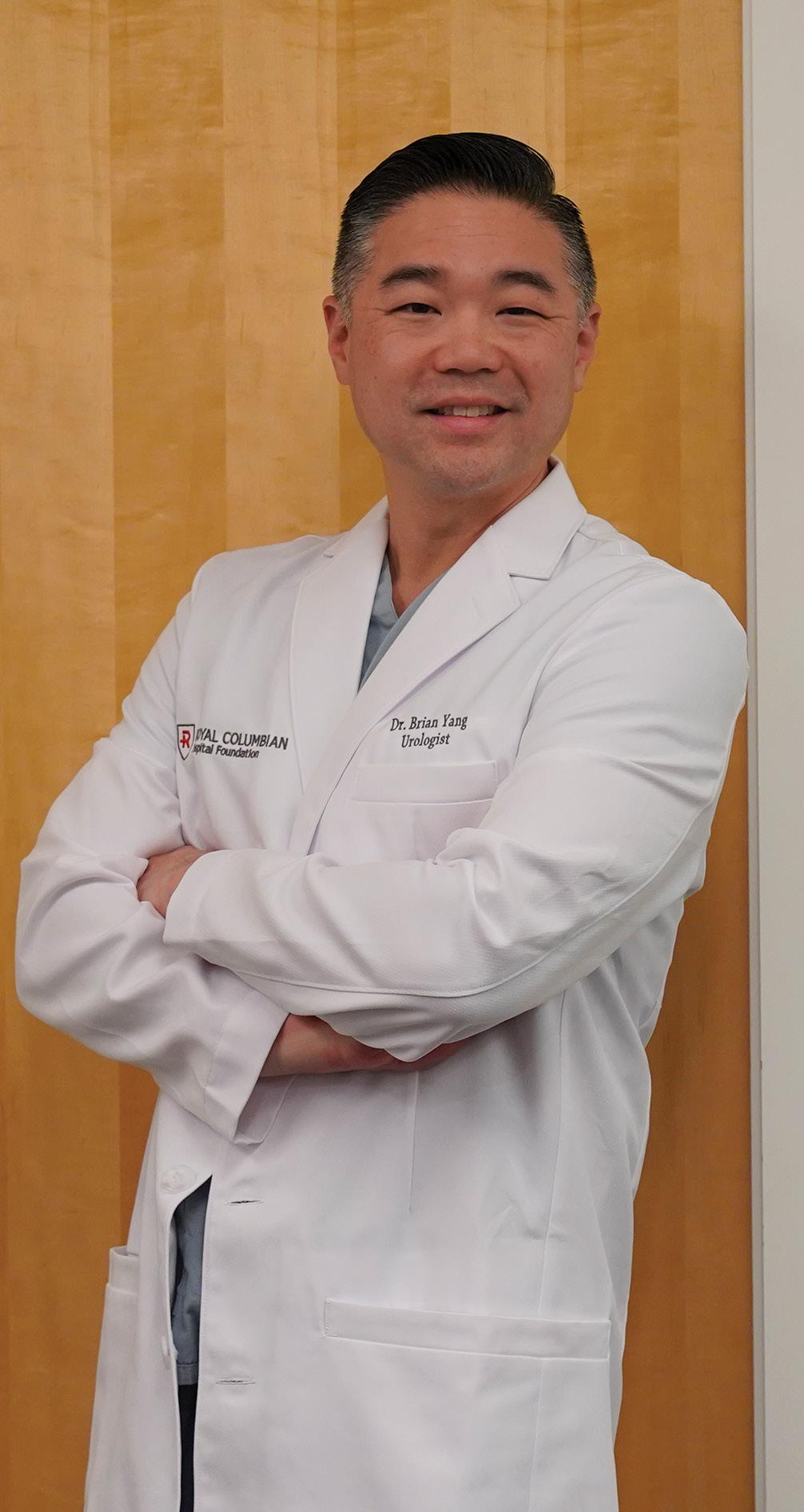
10 A Vision Unveiled: Dr. Kenneth Ryan and the Transformative Power of the Jim Pattison Acute Care Tower
12 Rebuilding A Life: Chris Jameson’s Story of Overcoming Life-Altering Injuries and Discovering a New Normal
14 Your Legacy Matters: A Royal Columbian Hospital Foundation Special Feature on Future Giving
17 Complex Problems Need New Solutions: Pioneering Solutions for Healthcare Challenges
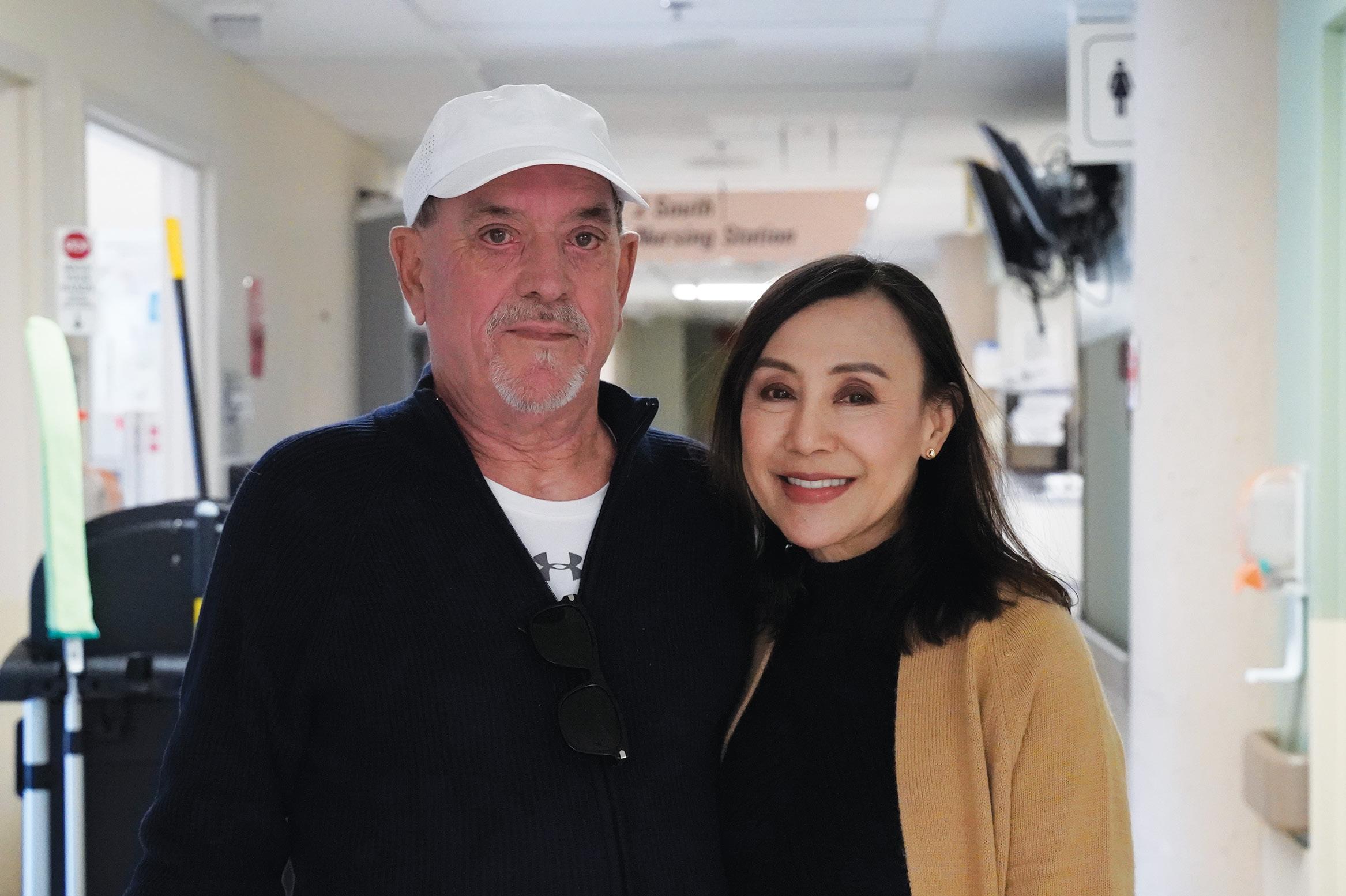
Duff’s Encounter with Extraordinary Care
I’ve learned that life is precious, and life is unpredictable, absolutely unpredictable,” says Glenn Duff, a past patient at Royal Columbian Hospital.
He would know that well.
When Glenn and his wife were in Italy in the summer of 2022, he collapsed from a massive illness. “I got the illness when we went to Europe — and by the time I was there, I was deathly sick.”
He was considered dead and recalls watching the experience of his resuscitation from above as doctors worked to save him. After a month
and a half stay in the hospital in Italy, following a surgery and necessary recovery time, Glenn was transferred to Royal Columbian Hospital in October 2022.
“I think it’s close to a miracle that I’m sitting here today.”
At that critical time, he remembers feeling comfortable — even as he was transferred by air ambulance in the middle of the night and as he encountered other near-death experiences in his recovery.
Over the next four and a half months, Glenn experienced the exemplary care Royal Columbian Hospital gives to all
its patients as he stayed in the cardiac department. “It’s everyone from the cleaning staff that I would see daily, to the nurses, who were obviously top rate people. The caregivers were excellent. And all three of my doctors were wonderful — I had absolute confidence in them, every one of them.”
His wife, Diana, agrees. “I say this is second home to me because I was here every day, for those four and a half months.” Reflecting on the experience, she says, “I didn’t feel like I was alone taking care of a husband or worrying about a husband. It was the whole community of Royal Columbian.”
Diana continues, “I learned that it’s a whole community of people who help in giving and restoring life in any way they can. It’s not just one doctor, or one nurse. It’s a whole team of doctors and nurses — even the cleaning staff — that without them all, a hospital will not exist.”
Over the next four and a half months, both Glenn and Diana experienced that community and care in a special way. “The doctors took time to talk to me and explain things because you don’t really know what’s happening in your life when you’re stuck in an emergency bed. They were very professional with what they did, but there was a real personal care attached to it,” says Glenn.
After six months of living in hospitals
in Italy and Royal Columbian Hospital, Glenn was finally released, and continued his emotional and physical recovery. “It’s taken time to rebuild. It’s frustrating when you can’t do anymore what you did before. Overall physically, I think it’s pretty amazing how I’ve recovered.”
He knows some of that is due to the technology, equipment, and building of Royal Columbian Hospital itself. “What I recognized when I was here was the vast amount of life saving equipment that I was on personally. It was necessary in the hospital to keep people alive,” says Glenn. “The equipment this hospital has, to me, is first rate, and thank goodness for that.”
It’s this effort, care, and overall
expertise that keep Glenn and Diana passionate about sharing their story today. “I saw how much effort they put in to take care of Glenn. I learned that Royal Columbian is a hospital that is true to its mission. I can really say he got the best care,” shares Diana.
“I learned that it’s a whole community of people who help in giving and restoring life in any way they can.”
- Diana Duff
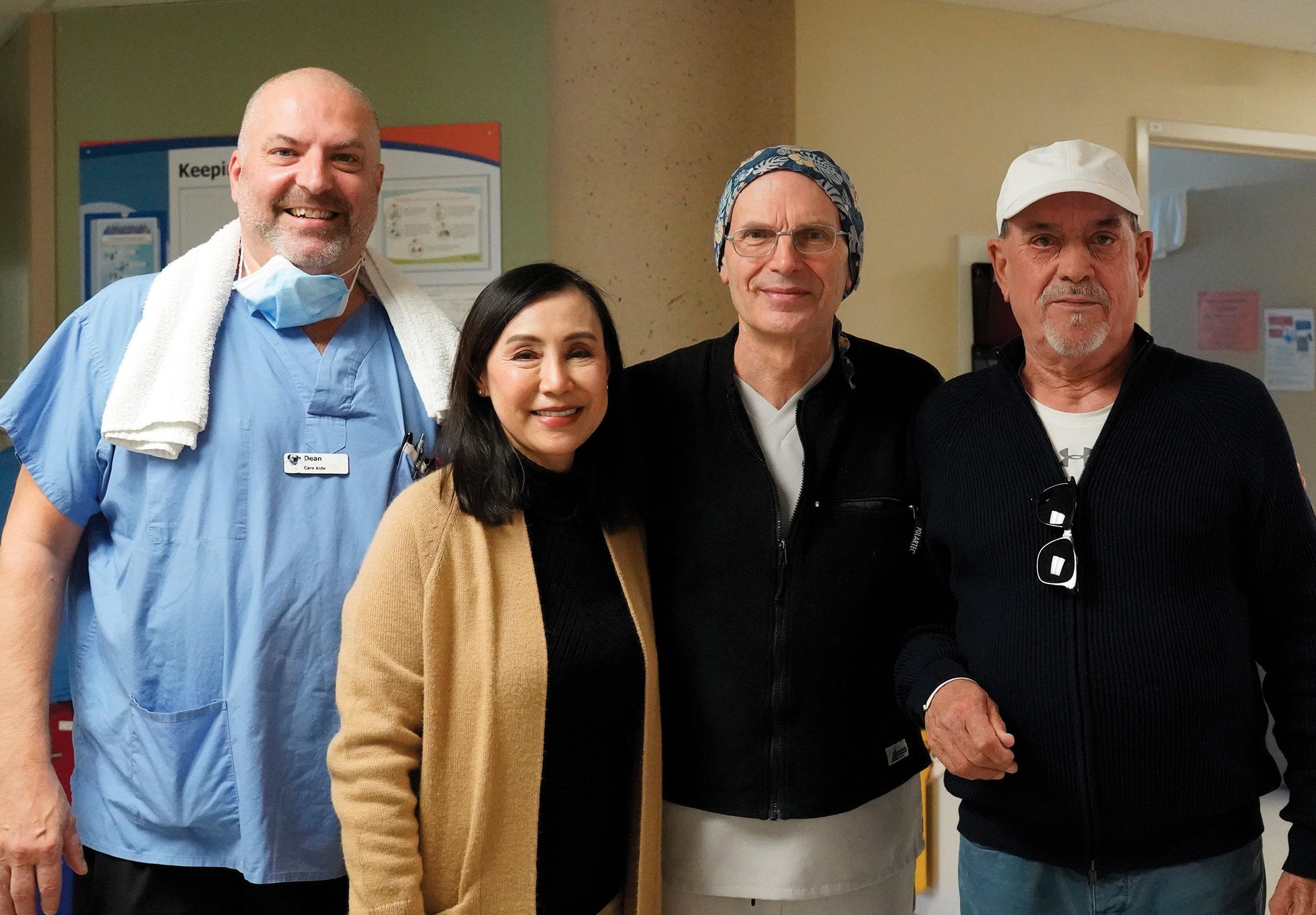
“The robotics program sets a new benchmark for excellence in surgical practice,” says Dr. Brian Yang.
In a world of medical innovation, where technology and precision intersect, robotic surgery is the next frontier. “Robotic surgery continues to transform the landscape of surgical procedures within all specialties,” says Dr. Brian Yang, a surgeon at Royal Columbian Hospital.
Since 2016, Dr. Yang has worked with his colleagues, Dr. Christopher Wu and Dr. Nathan Wong to bring a robotics program at Royal Columbian
Hospital.
For years, Dr. Yang, Dr. Wu, and Dr. Wong built their expertise in laparoscopic surgery. They developed minimally invasive surgical techniques for complex kidney, bladder and prostate surgeries — and this laparoscopic surgical program was built with collaboration and good patient outcomes.
But pure laparoscopic surgery is becoming a thing of the past. More
focus, discussion, and advances are being made on robotic assisted surgery. The three doctors felt the time was right to begin a transition into a robotics program, especially with Dr. Wong, an expert in robotic surgery, on their team.
“The pursuit of excellence and providing our patients with the best care is every physician’s goal,” says Dr. Yang. “Surgeons are drawn to robotic surgery as it enables intricate maneuvers with greater accuracy.
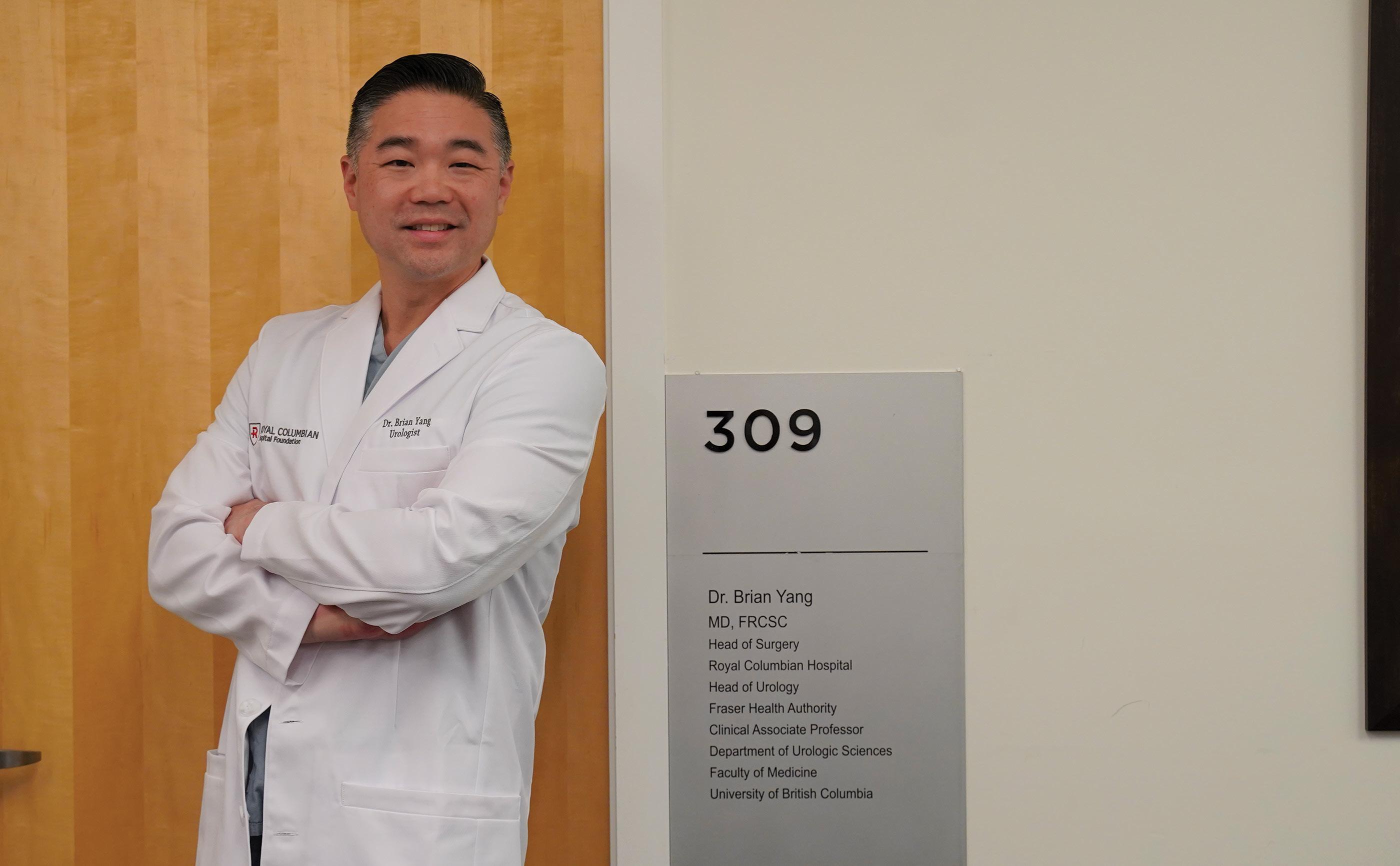
With the opening of the Jim Pattison Acute Care Tower in 2025, brand new, stateof-the-art operating rooms will be available to Royal Columbian Hospital — and these technological advances can begin to become a reality.

It amplifies the surgeon’s skills, particularly in delicate and complex procedures.”
It’s collaboration with other doctors, like Dr. Wu and Dr. Wong, as well as with hospital leaders and foundation supporters that’s pivotal in driving this continued invocation forward.
“The synergy between medical professionals and hospital leadership drives not only the adoption of innovative robotics systems but also shapes comprehensive training programs, governance structures, and seamless workflows to maximize the program’s impact on patient-centred care.”
While Canada has adopted robotic surgical systems, patient access to robotic surgery is limited in BC. There is only one robotic program available for the province — which means many patients are missing out on the benefits robotic surgery could provide for their patient care.
Robotic surgery offers potential for reduced postoperative pain, faster
recovery times, shorter hospital stays, quicker returns to daily activity, and improved clinical outcomes.
The future of robotic surgery also holds much potential for patient outcomes. Technology is evolving that will allow surgeons to visualize cancer in an organ with a fluorescent light, making it clear for surgeons to get the whole tumour out. Artificial intelligence has the potential to extend techniques and improve accuracy.
With the opening of the Jim Pattison Acute Care Tower in 2025, brand new, state-of-the-art operating rooms will be available to Royal Columbian Hospital — and these technological advances can begin to become a reality.
Which means that Royal Columbian Hospital and community will have access to this cutting-edge technology next year!
“Royal Columbian Hospital will become a hub for cutting-edge surgical techniques, drawing patients
seeking advanced, high-quality care from the region and beyond, ultimately positioning the hospital as a leader in surgical excellence throughout the province,” says Dr. Yang.
Dr. Yang notes that Royal Columbian Hospital Foundation has been critical in their support of this program.
“Without the generosity of the foundation and all of the donors, this would continue to be a pipedream of mine. I am so proud that we will be the second hospital to have a robotics program in BC,” he says. “I am excited for our patients and the future of minimally invasive surgery in Fraser Health.”
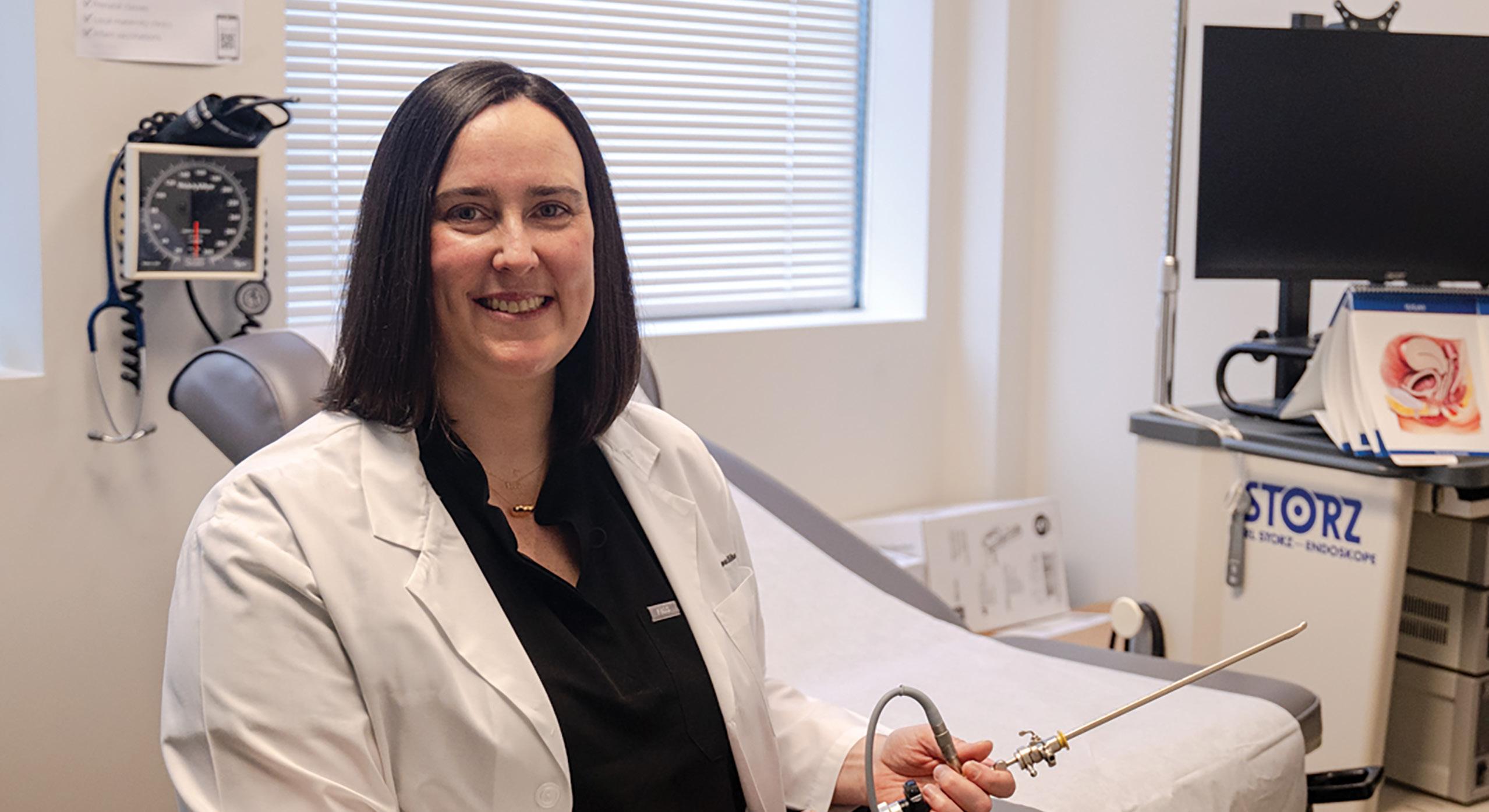
Royal Columbian Hospital’s Multidisciplinary Approach to Placenta Accreta Spectrum (PAS) “PAS is a highly complex and potentially life-threatening disorder which demands an experienced care team with access to specialized resources: this program did not exist in BC.”
Dr. Sara Houlihan knows pregnancy is remarkable; “mothers carry the juxtaposition of bringing life into the world while risking their own”. She sees it regularly in her work at Royal Columbian Hospital in the Placenta Accreta Spectrum (PAS) clinic.
PAS is a serious pregnancy condition where the placenta grows into the uterus and cannot detach after delivery. Dr. Houlihan describes it as a “morbidly adherent placenta”. This causes massive and potentially lifethreatening bleeding.
“Each case is seared into my memory because of how critically ill these patients have been,” says Dr. Houlihan.
The bleeding can be catastrophic, with some women losing half their blood volume with the need for multiple blood transfusions. There is an 85% chance of an emergency hysterectomy, which means they lose the ability to carry future pregnancies and grow their family.
Despite increased interest and research in PAS, two-thirds of cases are not diagnosed until the time of delivery. There are no biomarkers and no test to definitively diagnose it. Oftentimes, it’s discovered at the time of hemorrhage… and by then, it can be too late.
Thanks to Dr. Houlihan’s work engaging a multidisciplinary team of
physicians, who volunteer their time to the program, Royal Columbian Hospital is developing a provincial referral centre for all B.C. women suspected to have PAS.
“One of the best attributes of our clinicians at Royal Columbian Hospital is that we are so invested in patient care and making it better,” says Dr. Houlihan. “The Placenta Accreta Spectrum clinic does just that.”
The best patient outcomes result from centralized, multidisciplinary care settings, where the extreme complications can be prevented. There are key features to this PAS care model— including specific imaging expertise, specialized

surgical teams, interventional radiology, and more. All of which Royal Columbian Hospital has.
In fact, it’s the only clinic in British Columbia providing this formalized level of care to women with this condition.
With the PAS clinic, Dr. Houlihan and her colleagues are able to improve their diagnoses, making it easier to identify high risk patients earlier. They’re then able to work with patients to deliver at a later gestational period, reducing delivery of premature infants. They are also able to avoid urgently booking ORs. Patient outcomes are better too.
“Already we have reduced blood loss, decreased transfusion rates and reduced length of hospital stays – this makes a huge difference for patients” says Dr. Houlihan.
This clinic is also revolutionizing PAS surgery. With collaboration across Canada and the United Kingdom, Dr. Houlihan and her

“It’s the essence of Royal Columbian. People just come together to take on these initiatives,” says Dr. Houlihan.
colleagues were able to come up with a solution for a patient who had PAS and was adamant about keeping her uterus. They were able to do a “first of its kind” procedure in Canada, enabling the mother to carry that pregnancy to term and give birth to a healthy infant, with the chance of another pregnancy in the future.
“It’s the essence of Royal Columbian. People just come together to take on these initiatives,” she says. “Who would tackle the most complicated condition in obstetrics willfully? But we knew there was an unmet need in the province.”
The work isn’t finished yet. Dr. Houlihan and her team have dreams of remote imaging to accommodate those far away from Royal Columbian Hospital. They are also working towards improving surgical outcomes by learning new technical procedures. And, as many patients grapple with the huge, life-changing condition, she would love to see more mental
health support available to patients at the clinic.
Yet she’s grateful for the work that has already been done — both with her dedicated colleagues who have selflessly contributed to the clinic’s success, and with Royal Columbian Hospital Foundation. “The foundation has been like a beacon,” she reflects. “The fact that they’ve been able to support us through funding has been the reason that we’ve been able to do the work that we have done.”
And she dreams of a future where further support leads to even more remarkable outcomes for their patients.

Imagine walking into a hospital and being able to receive all the interventions you may need — on the same floor.
This will become a reality with the interventional “superfloor” on the second floor of the new Jim Pattison Acute Care Tower, scheduled to open in 2025. With 8500 square metres of floor space, the floor will be the largest of its kind in Canada.
Dr. Kenneth Ryan, head of the department of anesthesiology and perioperative medicine, is also the physician lead for interventional clinical planning, specifically for the interventional floor.
“The concept of the interventional platform co-locates surgical, interventional cardiac, and interventional radiology procedures into a single collaborative space,” he
says. “The idea is that co-localizing services…could allow for more efficient functioning of various disciplines and mitigate the need for extra beds.”
The goal is to improve patient care by providing a place where patients who require multiple different and complex procedures can have it all done in one space or one platform.
“We need to make sure we can offer the level of care that people expect and people deserve.”
Dr. Ryan also notes that this design increases the opportunities for collaboration between surgical and interventional disciplines.
“By co-locating everything on a large platform, physical adjacency breaks down a lot of the barriers to collaboration.”
“Really, it’s about those hallway
conversations. It’s about knowing who’s available if somebody needs an urgent chat about something for a patient.”
The interventional platform is being built with the future of the growing lower mainland in mind. The team is looking at the overall demographics of the community and projecting patient volume three, five, and ten years into the future — and recognizing that it will be more than patients utilizing the space and services, but projecting for the necessary additional health care providers and family members as well.
“The surrounding community we know is growing rapidly. There’s very much a need for this space.”
Beyond the innovative design for collaboration, the floor will feature new, state-of-the-art equipment.
On the interventional side, the new equipment is designed to limit the amount of time from entering the hospital to getting the exact help needed.
On the surgical side, new equipment includes a robotic arm made by Siemens, which creates CT scan like images throughout the operation, state of the art imaging platforms for neuro and vascular surgery — and the upcoming robotic surgical intervention program.
When Dr. Ryan reflects on the impact this interventional superfloor will have on patient care, he says, “The hope is that this floor will provide more timely access to care for the patients in the community. We have the ability to hopefully reduce the length of time it takes for somebody with a big problem to get timely access.”
He doesn’t just see the impact on patient care — he also sees the positive impact this will have on staff. “Looking at the future of healthcare, it’s never been more apparent how valuable our healthcare workers are
and how badly we need them. One of my goals has been to imagine how we create this platform as somewhere people want to come and work in every day.”
The goal is for the platform to be split into zones —- with an interventional zone with five radiology suites and three cardiac catheterization labs; a surgical zone with three cardiac operating rooms, 11 general operating rooms — including one dedicated to robotic surgery, and three hybrid operating rooms. These hybrid operating rooms will be equipped with advanced medical imaging technology for specialized neurosurgical, vascular, cardiac, and other techniques.
Through it all, Dr. Ryan sees how the community has been a part of this — particularly through their support of Royal Columbian Hospital Foundation.
“Every day, you walk through the operating room — or whatever space you’re in at RCH — and you can see the impact of the foundation,” he says. “Some of the biggest innovative changes that happen at this site are as a result of efforts from the foundation.”
“Royal Columbian Hospital is the oldest hospital in the province. It’s a very exciting moment as we’re building this tower to see how it’s going to change the work and shape of Royal Columbian.”

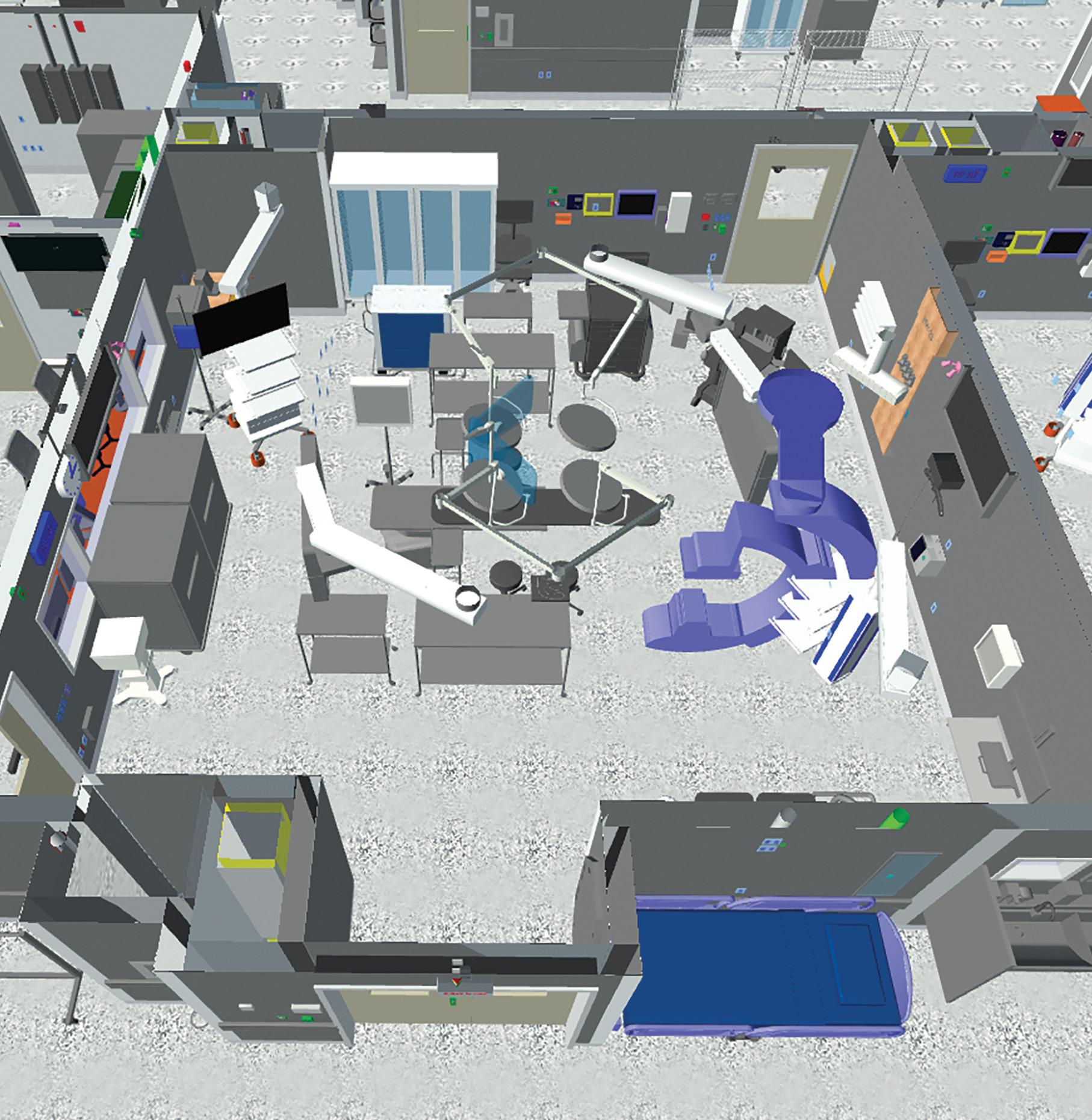
- it will be equipped with advanced medical imaging technology for specialized neurosurgical, vascular, cardiac, and other techniques.

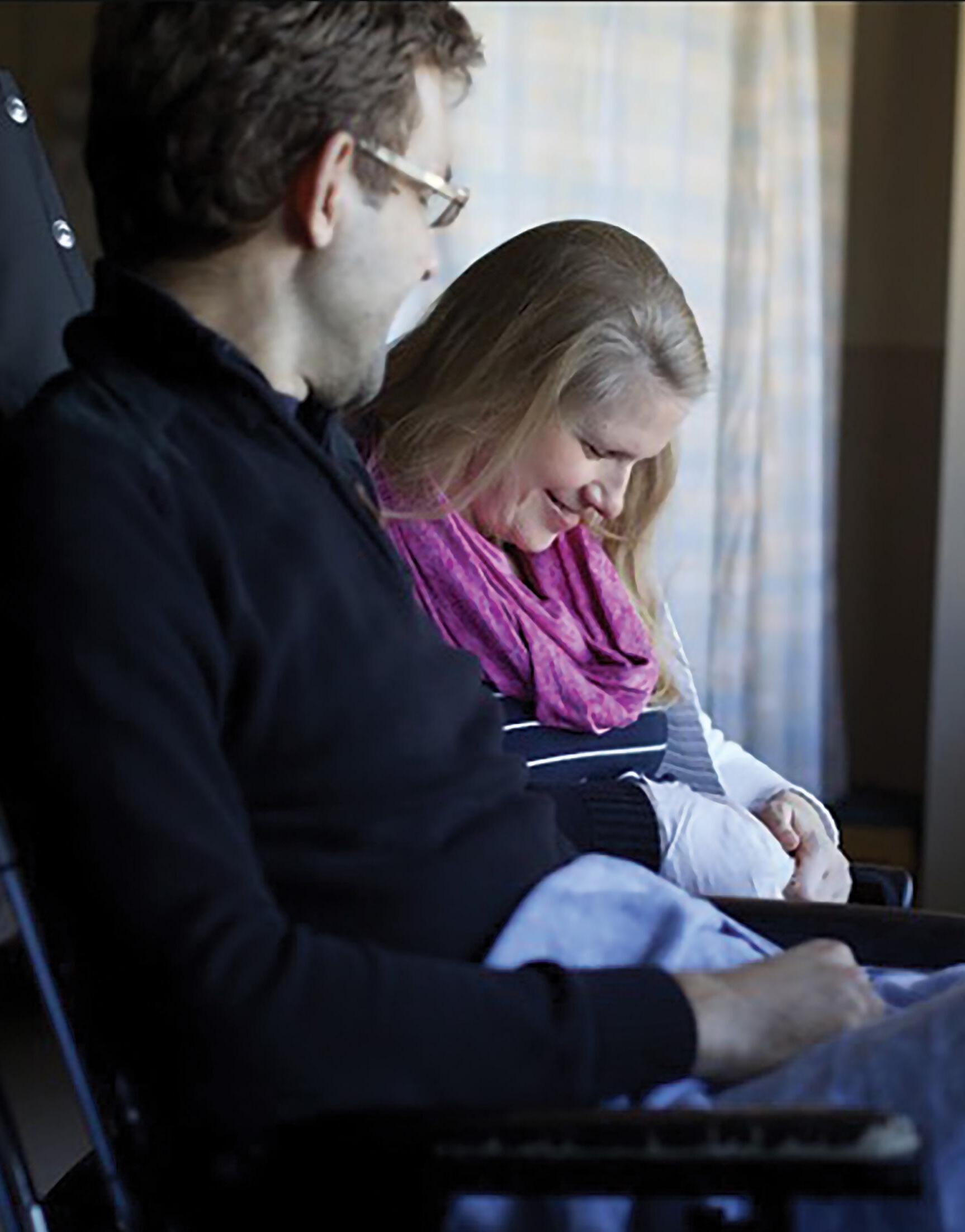
November 6, 2016 was the day Chris Jameson’s life changed forever.
Before that fateful day, Chris had worked as an accountant at KPMG, growing in leadership and responsibility at the company. He balanced his demanding career with his passion for cycling — and he and his wife, Veronika, were eagerly anticipating the birth of their first child in January 2017.
But then, November 6 happened. It started out as a regular Sunday morning. Chris joined his cycling team, stopping for breakfast and taking their usual route to River Road — until tragically, Chris and his friends were hit by a sleep-impaired driver. Out of the six cyclists, one passed away at the scene, three were minimally injured, and two faced lifethreatening injuries. One of those two was Chris.
He spent two weeks, drifting in and out of consciousness. When he woke up, he was in Royal Columbian Hospital’s Intensive Care Unit (ICU) in severe condition. His injuries ranged from broken body parts, a punctured lung, to a severe traumatic brain injury (TBI).
“When I first saw him in the hospital, I was struck by the fact that Chris was focused on everyone other than himself,” says Carlo De Mello,
Chris’ manager at KPMG. “He was grieving the loss of a close friend, concerned for Veronika’s wellbeing and hugely motivated to be well enough to be present for the birth and homecoming of his soon-to-beborn son.”
Chris spent about three months at Royal Columbian Hospital in intensive recovery. He did miss the birth of his son, Andrew, but was discharged soon after the birth to be with his family as they learned to navigate this new normal.
When reflecting on his motivation, Chris shares, “Ironically, the biggest motivator for me was also one of the biggest challenges you can have with a TBI — a screaming baby. Andrew nearly didn’t have a dad, but he and Veronika have been by my side since I came out of the hospital and encouraged me every step of the way.”
He was surrounded by support during his long road back to recovery. Andrew, Veronika, the staff at Royal Columbian Hospital, his team at KPMG, and more helped Chris in the seven years since his accident.
“Chris was extremely motivated and always had a positive attitude when I treated him,” says Dr. Rajiv Reebye, who treated Chris at Royal Columbian Hospital. “He defied my expectations as a physician in that he has now been able to return to his pre-accident work duties at 25 hours a week. He is truly in the 1% rule for our patients with severe traumatic brain injuries.”
It wasn’t always easy for Chris. He faced limitations he had never experienced before. “These were daunting challenges, and progress was measured in years rather than weeks.” Relearning the basics took time — and his TBI and physical injuries made what he used to do much more difficult. He worked closely with professionals in his

recovery to develop strategies to overcome challenges.
“Anyone who has been impacted, especially by a severe TBI, will understand that this is one of the greatest challenges to overcome: getting to know your new self and knowing how far your limits can be pushed,” he says.
But more than anything, Chris is grateful for how the life-saving care he experienced gave him the rest of his life. “My experience grounded me and made it clear how our emergency and medical services are such a foundational part of our community. In our busy lives, we often take them for granted — but they are there when you need them, and I will be forever grateful.”
“I am filled with more and more gratitude to all the people who cared for me and provided essential support. I didn’t have much experience with hospitals before my accident, but it became clear to me how being a doctor, nurse, or carer is so much more than a ‘job’. It takes a special kind of person.”

Often, folks are hesitant to draft a Will. That’s understandable. Wills inevitably lead us to think about our own mortality. Let’s face it – death is an uncomfortable topic. For some, that discomfort prevents them from ever making a Will. This is unfortunate, because drafting a Will can be a rewarding, life-affirming experience.
The process of drafting a Will asks us to reflect on who and what are most important to us. We review our life story and take account of the moments that shaped us, the people who love us, and the principles that make us who we are. Our Wills are a lasting declaration of what mattered to us during our lives, and how we want to be remembered.
A Will celebrates, recognizes and protects what you hold dear. It is also a way of passing your values down to the next generation, particularly when you include a charitable gift to an organization close to your heart.
There are many reasons why our supporters choose to include a gift in their Will to Royal Columbian Hospital Foundation. Their reasons are all unique, but they have something in common - Royal Columbian Hospital was a significant part of their life story.
Often, the experiences patients and their family members have at our hospital are life changing. The birth of a child. A life-saving surgery. Kind and compassionate care for a loved one through an illness. These

experiences move people to express gratitude and support future patients and families who come to our hospital in need of life-saving care. For them, their gift has much more to do with life than it does with death.
If you have left or are inspired to leave a gift in your Will to Royal Columbian Hospital Foundation, you have our warmest thanks. I would love to hear your story.
Catherine Cornish, CFRE Director, Leadership and Legacy Giving P. 604-970-5931 catherine.cornish@fraserhealth.ca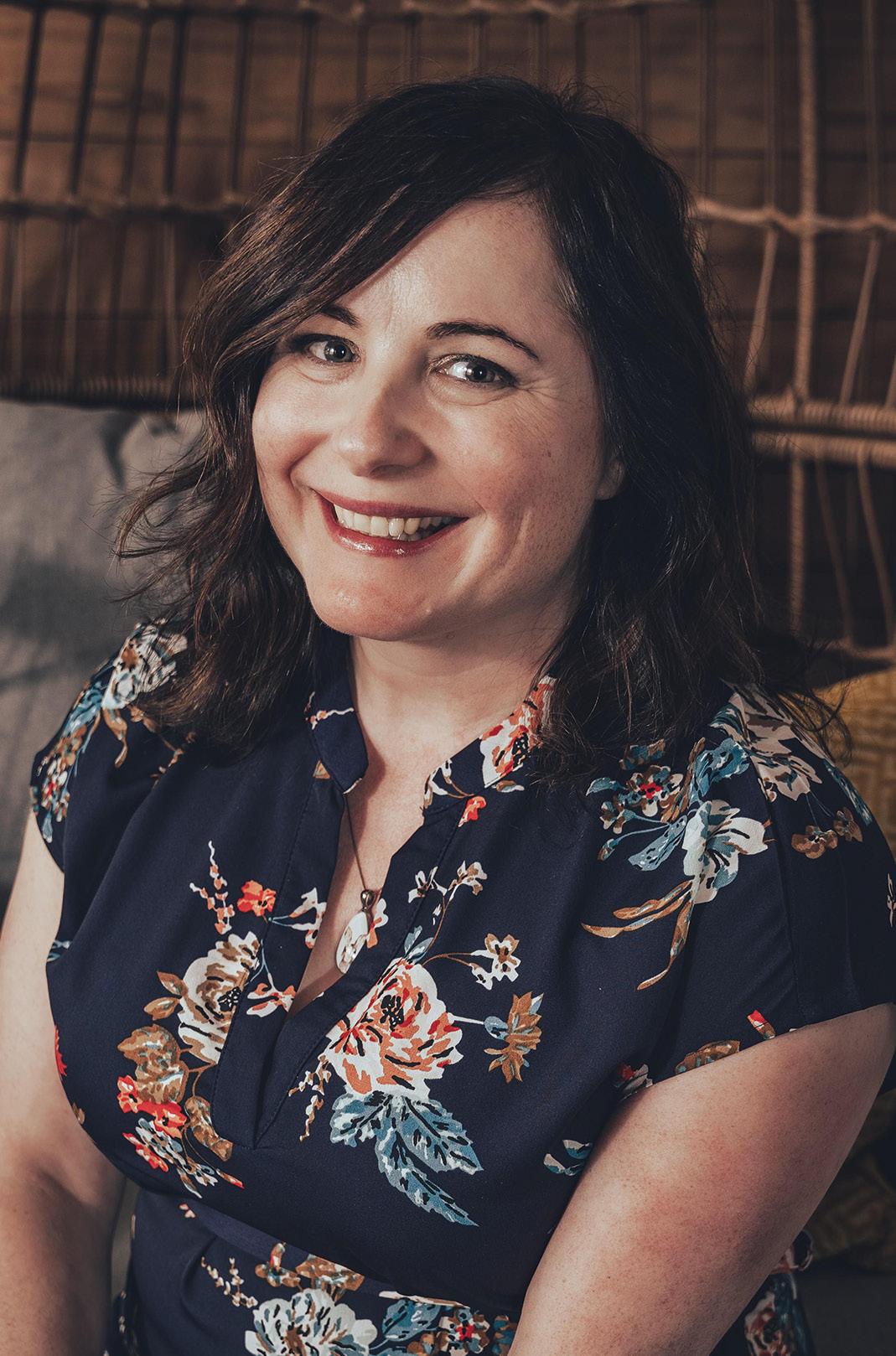

Coquitlam resident Lillian Svensson has spent the majority of her life caring for others. As a stay-at-home mom, she raised three children – Gregory, Christine, and Steven. When they were grown, she worked as a Community Health Worker for Fraser Health and volunteered with Crossroad Hospice in Coquitlam. In retirement, she volunteers at the Adult Day Program at Hawthorne Seniors Care Community in Port Coquitlam.
“I’ve always enjoyed helping people,” says Lillian. “The people you care for teach you a lot.”
In 2012, Lillian had to care for her husband John, who was suffering from emphysema and pulmonary hypertension. Hailing from Denmark, John had been a mechanic for the Royal Danish Air Force. After immigrating to Canada, he learned English by watching television and worked as a maritime mechanic. “He was always good with his hands,” Lillian recalls. “He built our first complete stereo from scratch, including the tuner and speakers. John could fix anything.”
John received treatment at Royal Columbian Hospital. Lillian credits the care he received there with extending his life. “He lived a year longer than he was expected to,” she says. “The nurses and doctors were excellent.” Sadly, John passed away on August 10th at the age of 75.
Lillian was dealt another blow in 2016 when her son Steven was diagnosed with lymphoma at just 34. “Steven had a heart of gold,” says Lillian. “He adored his nieces and nephews.” He also had a talent for building and a sense of
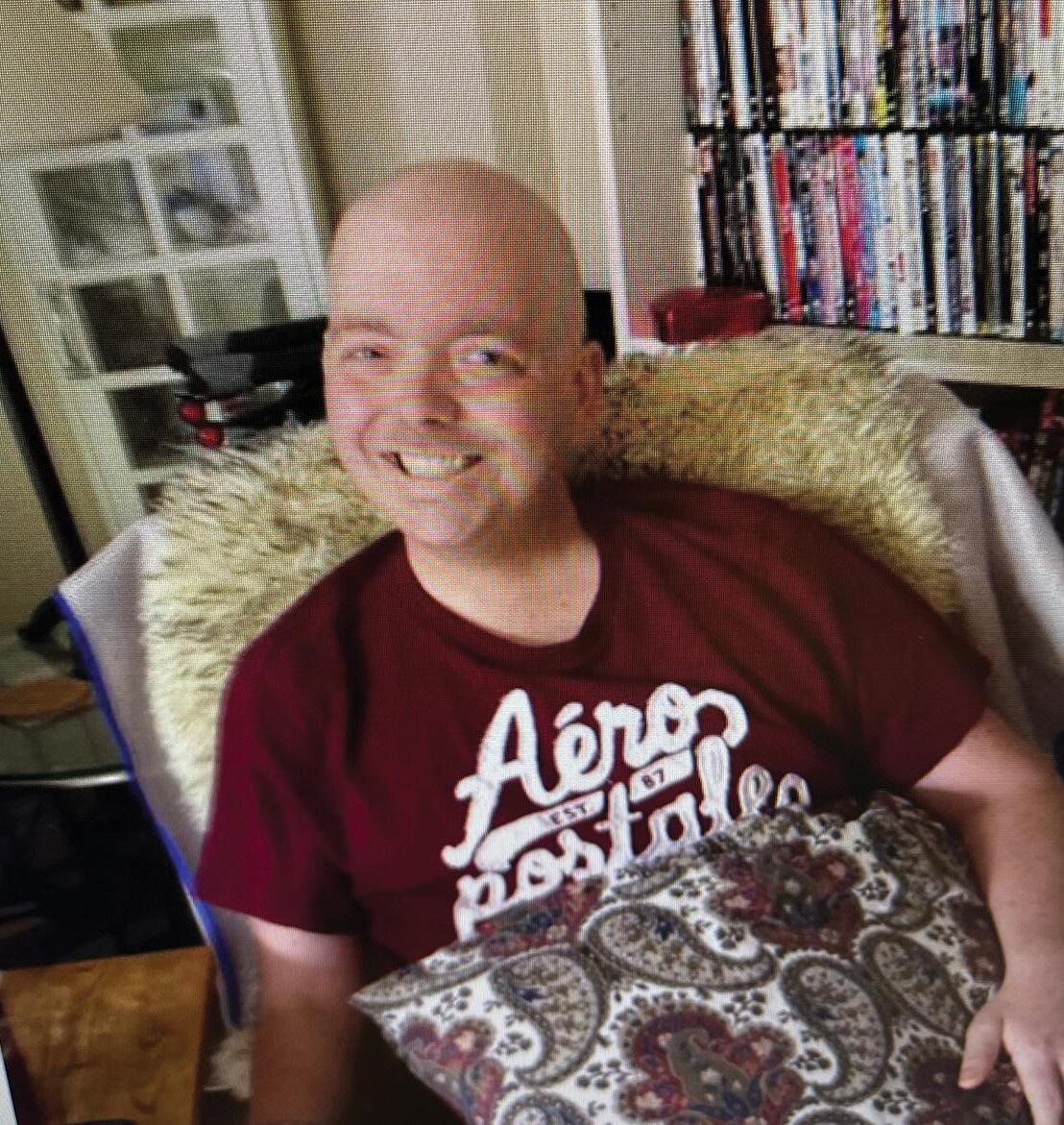
humour, both inherited from his father. “The two of them would laugh at the stupidest things,” Lillian remembers with a smile.
Steven was also cared for at Royal Columbian. Neurosurgeon Dr. Andrew Lee discovered that he had six tumours on his spine. Lillian was crushed when Steven passed away a week before his 35th birthday. “Part of my life ended when my son died,” she says.
Rather than bitterness at two great losses, Lillian feels gratitude for the care John and Steven received. “I appreciate what RCH did. I can’t say thank you enough.”
When it was time to write her Will, Lillian wanted to express her gratitude with a gift to Royal Columbian Hospital Foundation. “I can’t give much in life,” she says, “but I can leave a legacy. I saw the care that was afforded to my family and it meant a lot to me. This is my way of saying thank you.”
She continues, “I also don’t need much in life. But I want to know that after I’m gone, I’m still making a difference. I feel so positive knowing I’m leaving a legacy.”
Lillian feels the act of giving helps with her grief. “Giving back helps to ease the pain,” says Lillian. “It gives me inner strength.”
So does caring for others. Lillian knows that because she has experienced loss, she has greater empathy for others. “You have to go through adversity. We are all on life’s journey. It helps to realize you’re not alone.”
In draft legislation last year, the Federal government proposed tax changes that may affect the tax credits you receive for your charitable donations. These proposed changes were to the Alternative Minimum Tax (AMT).
The AMT, as its name implies, is the minimum amount of tax you have to pay. Essentially, it is an alternative tax calculation that runs parallel to the normal tax calculation in your annual income tax return; whichever result is greater is your tax liability for the year. AMT typically arises when you earn preferentially taxed income, claim preferential tax deductions to reduce your income or certain credits to reduce your tax liability.
The proposed changes to the AMT would reduce the tax benefits for charitable donations by individuals in the calculation of AMT. They include a 50% reduction of the donation tax credit and a 30% reduction in capital gains exemption for charitable donations of publicly listed securities.
The Federal government has not yet passed the AMT draft legislation, creating uncertainty about when the proposed changes will take effect. They were proposed to take effect on January 1, 2024.
So, consult your wealth and tax advisors in a timely manner if you may be donating to charity to discuss planning options available to you in preparation for any potential changes to the AMT and its impact on your charitable giving.
A philanthropically savvy wealth advisor can help you make the most of your charitable donations. This requires taking a holistic approach that blends personal, financial and philanthropic goals.
Wealth managers like the Funke Group are happy to work with your charity of choice to create meaningful, financially smart gifts you will feel great about giving.
Ross Vender, Wealth Advisor
The Funke Group 604.535.4711
www.thefunkegroup.com
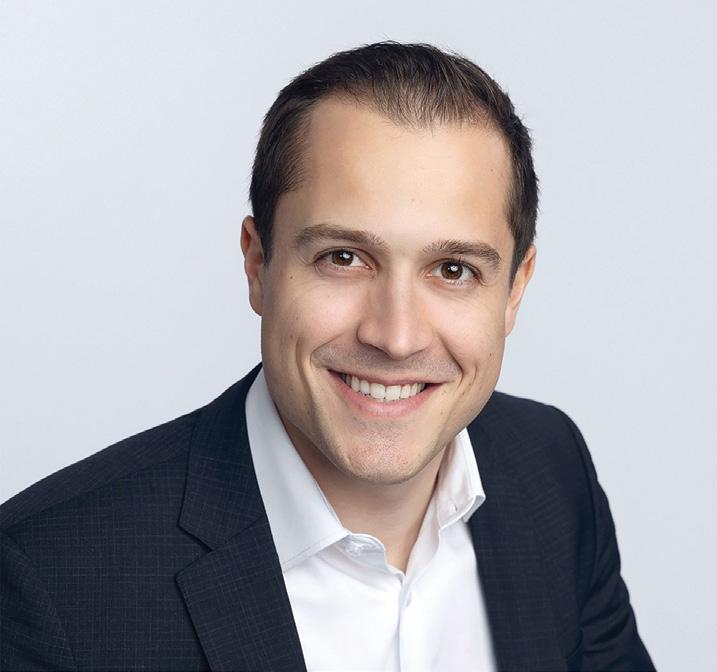
date hereof and are subject to change without notice. While care and attention has been taken to ensure the accuracy and reliability of the material in this publication, neither Scotia Capital Inc. nor any of its affiliates make any representations or warranties, express or implied, as to the accuracy or completeness of such material and disclaim any liability resulting from any direct or consequential loss arising from any use of this publication or the information contained herein. This publication and all the information, opinions and conclusions contained herein are protected by copyright. This publication may not be reproduced inwhole or in part without the prior express consent of Scotia Capital Inc.

By the time you read this, I will be days away from turning 50. As I reflect on this milestone, I look back to when I started my journey in supporting healthcare communities 30 years ago.
The landscape was fraught with challenges. But at the time, they appeared simpler and less pressing. Perhaps this was because I was a young man, and my own health was a distant concern. However, it is undeniable that healthcare challenges have only grown more complex and urgent in recent years.
The COVID-19 pandemic served as a profound wake-up call, highlighting the complex challenges confronting our healthcare system. Among these is the critical issue of a diminishing workforce battling burnout. The obstacles we face are manifold, emphasizing the urgent need for innovative solutions. Solutions that our Foundation helps provide, but we had to evolve to be able to do that. Today I would like to share with you a bit of that journey.
The Foundation was established four years after I was born, with the single aim of raising funds for the region's first CT Scanner and for some time
tools like this were our focus. This core objective of funding essential equipment remains the lion’s share of the funding we provide. Yet, out of necessity, we have broadened our support to ensure we can make the most significant impact possible on the healthcare system.
This started several years before the pandemic when our Foundation reflected on our role in supporting the healthcare system. We began with a pivotal question: what unique role can Royal Columbian Hospital Foundation play in improving care at the hospital?
We decided that our purpose was to assist the hospital and its extended community in addressing challenges they could not easily tackle alone –regardless of what those challenges were. This realization marked the start of an expansion of our mission.
The need for innovation within our healthcare system is pressing, and as an agent of change, the Foundation must adapt our approach to tackle the complex issues we aim to solve.
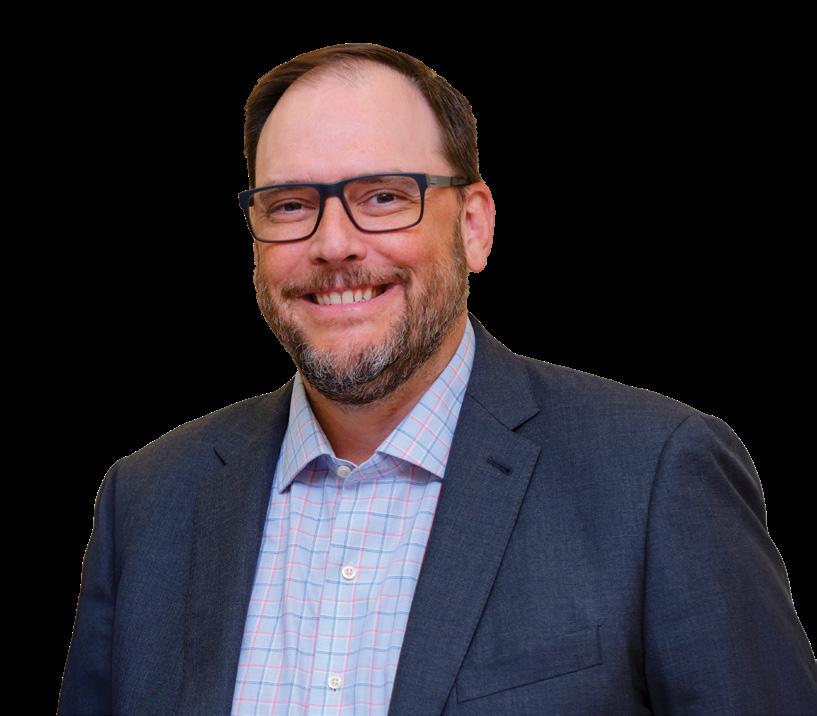

This evolution has been guided by our stakeholders — patients, clinicians, healthcare leaders, and notably, by our donors.
A recurring theme emerged from our discussions – the critical importance of focusing on the people providing direct patient care. This propelled us into new areas, including expanding our support for research and quality improvement, clinician recruitment, healthcare provider wellness, and new avenues for innovation to germinate and grow.
Continues on the next page >
CONTINUED FROM PAGE 17
Though research might appear abstract to many donors, discussions with physicians underscored that attracting and retaining top talent relies on three main elements. The most significant is the chance to profoundly impact patient lives.
As Royal Columbian cares for some of the most critical cases in our province, our clinicians seize opportunities to make meaningful differences every day. The second element is the strong desire of clinicians to mentor and impart knowledge to the next generation of caregivers. This is evident in our extensive collaborations with postsecondary institutions across the province. RCH is an important and robust teaching site in the province. The last element is research as this is the opportunity to generate new knowledge, allowing clinicians to extend their influence beyond the patients they directly care for. This area, previously underserved by our Foundation, has become a focal point for increased support.
We assist our clinicians in embarking on their research journeys in a variety of ways, from seed grants and research
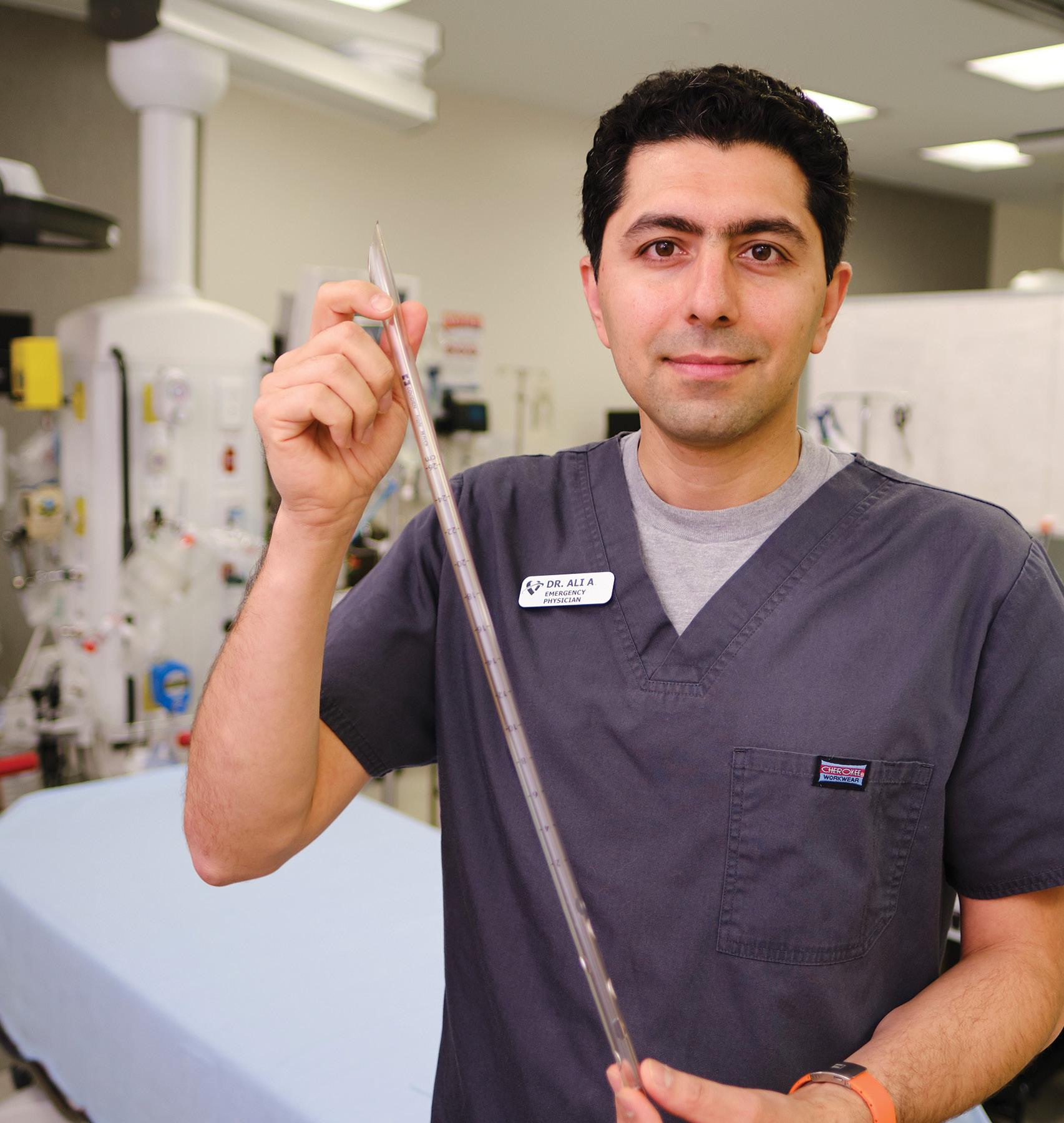
space to collaborative funding with UBC and SFU for research-focused positions in mental health, critical care, and respiratory care.
We have also bolstered support for quality improvement (QI). QI is all about enhancing patient care, improving health outcomes, and optimizing resources with continuous, data-driven efforts. It encompasses measuring current performance, identifying inefficiencies, implementing targeted interventions, and evaluating their effects to continuously improve healthcare delivery.
This effort centres knowledge creation at the forefront of care. We proudly sponsor initiatives in this domain, including an annual gathering of QI champions within
the hospital to share their work and engage others in this relentless pursuit of excellence at RCH.
Spurred by a visionary donor, seven years ago we initiated our Advancing Innovation in Medicine (AIM) project. AIM was created to support clinicians with their medical inventions to give them the opportunity to extend the impact they can have on healthcare even further. We provide funding and expertise to prototype new ideas,
As Royal Columbian cares for some of the most critical cases in our province, our clinicians seize opportunities to make meaningful differences every day.
Recognition programs are crucial in communicating appreciation to our healthcare professionals. They stand as a powerful testament to our collective recognition that, as they tend to our community in our most vulnerable moments, the community reciprocates with care and consideration.

secure patents, and disseminate them widely. This project now has broadened and also is providing an avenue for emerging health technology companies to partner with clinicians to bring innovation in patient care forward.
The final project living within the Foundation’s suite of research, innovation and QI support is the acquisition of Fraser Clinical Trials through targeted support. We recognized the need to enhance clinical trials within RCH and now support $1M in trials each year. As one of our physicians put it, trials allow him to offer his patients the newest treatments and provide new sources of hope for others.
These projects span the spectrum in terms of scope, funding required and potential impact, but they share a common component – building a culture of curiosity for better ways to provide healthcare.
During our reflection on our role, we knew that valuing the relentless dedication of our healthcare workers is of utmost importance. Our clinical staff must feel the community's unwavering support and appreciation. So we also broadened our support to take on a number of new activities, focused on cherishing our clinicians. Initiatives like our Awesome Fund are pivotal in this regard. This fund enables departments to directly recognize and celebrate their colleagues, helping to maintain a positive and nurturing working environment.
The Foundation also provides meals for staff, accomodations near the hospital during inclement weather free of charge, and other supports to make the Columbian a great place to work. We demonstrate our commitment to a nurturing work environment through random acts of kindness with 'thank you carts' that
roam the hospital, delivering snacks, small gifts, and motivational messages.
These programs are crucial in communicating appreciation to our healthcare professionals. They stand as a powerful testament to our collective recognition that, as they tend to our community in our most vulnerable moments, the community reciprocates with care and consideration. Although some gestures may seem modest, their impact on morale is significant.
The final area I want to touch on, is our efforts in connecting clinicians and leaders with educational, developmental, and partnership opportunities both within and beyond the healthcare sector. We are committed to fostering continuous learning and knowledge exchange to enhance the healthcare system.
Our support extends to scholarships, bursaries, conference presentations, and collaborations with organizations that transcend healthcare. These initiatives not only facilitate ongoing education, they also broaden the Royal Columbian Hospital community's reach and reputation, locally, nationally, and internationally. In turn, this helps to attract top-tier physicians and clinicians. We want the best!
I have developed a deeper appreciation for healthcare’s challenges since I began my career as a healthcare advocate 30 years ago. To meet them, we must push the boundaries of healthcare and do what the hospital and its extended community cannot do on its own. We know you are behind us. You have our sincere gratitude. Your support makes all the difference.
